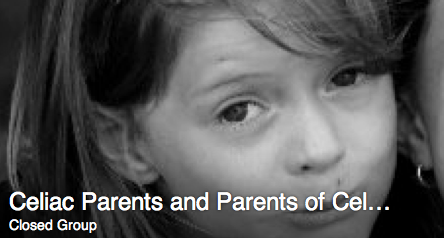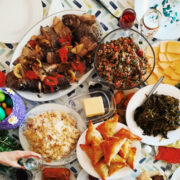What to Tell the Teacher About Your Gluten-Free Child
 How to prepare teachers for your gluten-free child
How to prepare teachers for your gluten-free child
With good communication and cooperation it is possible to create a safe school environment for your gluten-free child.
- What is Celiac Disease (CD)
- an inherited medical disorder that affects the absorptive surface of the small intestine is damaged by a substance called gluten
- body becomes unable to absorb nutrients: protein, fat, carbohydrates, vitamins and minerals, which are necessary for good health
- Low iron and osteoporosis can be associated conditions
Incidence / Diagnosis Rates
- 1 in 100 North Americans
- with digestive symptoms, 1 in 56
- 1 in 10 If you have a 1 ̊ relative with CD
- CD has a 3-5% diagnosis rate, average diagnosis time is 12 years
- 97% of celiacs are never diagnosed
Symptoms Can Include
- classic – thin person, bulging stomach, diarrhea, foul smelling gas
- adults – low iron, lactose intolerance, early onset osteoporosis, pre-existing disorder
- children – symptoms more gastric, small stature, irritability, inattention, lethargy,
- migraines, often sick or sickly, dark circles under eyes
- dermatitis herpetiformis (DH) fluid filled blisters, knees, elbows, extremely itchy
- Good news – children generally make a speedier recovery than adults
What Happens When a Celiac Eats Gluten?
- vomiting & diarrhea – may need the restroom immediately / may react in 12 hours
- may need to spend extra time in the washroom
- immediate medical attention is NOT required, there is no antidote ie epi-pen
- brain fog, unable to focus, lethargy, grumpy, irritable, flu-like symptoms for a day or a week
- may need more time to complete assignments
How Much Gluten is Enough to Cause a Reaction
- 10mg – a dime is 2200mg, 1 grain in 50,000
- Health Canada ruled that ‘Gluten Free’ means <20 parts per million
How is Celiac Disease Different than an Allergy?
- health effects are short term and long term
- gluten triggers an autoimmune response that can lead ta host of other autoimmune mediated conditions: Type 1 diabetes, Fibromyalgia, Sarcoidosis, Sjögren’s Syndrome, Thyroid disease, Myasthenia gravis, Parkinsonism, Interstitial cystitis, non-Hodgkin’s lymphoma and more
- allergic reaction is immediate, can be treated with timely provison of antihistmines, minimal longterm effects
How is CD diagnosed?
- Specific blood tests that screens for the antibodies that celiacs make
- If blood test positive, diagnosis is confirmed with a biopsy of the small intestine, taken under pleasant sedation
- If blood test negative, and symptoms persist, biopsy should still be performed
Non-Celiac Gluten Sensitivity (NCGS) 6-10% population
- Newly recognized condition. All the same overt symptoms, but have negative blood work, negative biopsy.
- Treatment is the same – gluten-free diet
What to Talk About with the Parents of Your Gluten-Free Student
- establish child’s precise needs – are they celiac, NCGS, Wheat allergy, lifestyle-choice
- how does child react to gluten ingestion – what to watch for
- parents MUST be notified of suspected / confirmed / accidental or deliberate ingestion
Scheduling
- for the year: seasonal events, holiday parties, pizza/hot dog/hamburger days, field trips with food as an activity, trips with restaurant stops, overnight trips, class birthday list
- for the week: food-oriented class activity so that parents can prepare with alternatives, educate chaperones.
- for the day: 24 hours advanced notice of special treats in the classroom so parent can prepare look-a-like options for student, make alternative meal arrangements
- ask for – and accept – help from parent
Food Protocol
- can only have foods provided or specifically approved by parents
- ask parent to provide a stash of approved treats to give in place of gluten treats
- if possible, reduce use of food as a reward in classroom
Meals / Snacks
- celiac student – wash table & hands before eating (keep wipes in desk)
- other students – wash table & hands after eating
- suggest GF place setting over table, pull table off tthe side, group the GF together
- monitors / supervisors / other students need to be aware of the protocol
- respect that the child- ie can’t eat their lunch because it had gluten crumbs on it
- students may need access to a fridge or microwave – sandwiches not always an option
Bathroom Privileges
- may not be able to wait, may take longer
- some may be to shy task – ask them instead
- establishing a code avoids embarrassment / keeps teacher informed
Special Student Challenges
- if student is new to the diet or too young to understand the diet (K-3) , ensure that they eat only their own food
- encourage ALL students not to chew on pencils, bite nails etc.
School Materials That Contain Gluten
- avoid Crayola Play Dough, Elmer’s Finger Paints, paper mache crafts, cheerios, pasta
- if wheat flour to be used, flour should be mixed outside the room if used at all
- airborne flour can hang in the air for 3-36 hours and settles on every surface
- after a gluten craft, all desks, scissors, pencils, crayons, surfaces should be thoroughly washed with soap and water
- welcome assistance – parent may offer to help out by making GF version for student or entire classroom.
- BEST PRACTICE – NO GLUTEN CRAFTS
Educational – Student / Teacher Materials
- Cilie Yack is Under Attack, Caryn Talty
- Mommy, What is Celiac Disease?, Katie Chalmers
- NoMore Cupcakes and Tummy Aches, Jax Lowell
- Eating Gluten-Free with Emily, Bonnie Kruszka
Download this printer-friendly version
I welcome your input! If you have any suggestions or comments about the above, please be in touch with [email protected]. Thank you!
Additional Resources:
- Alana Elliott, Founder of Libre Naturals, Shares Her Thoughts on ‘Back to School’
- Schools and Allergies Resource Hub – Canada
Ellen Bayens![]() is the Founder and President of The Celiac Scene™, the go-to gluten-free resource for Victoria, Vancouver Island and the Gulf Islands. Referred to as a ‘Remarkable Celiac’ by the Canadian Celiac Association (CCA) , Ellen speaks first hand and with infectious humour about the challenges of the diet and how they can become the gateway to good health. As Past Vice-President of the Victoria Chapter of the CCA and as ‘British Columbia’s Gluten-Free Ambassador,’ Ellen is happy to share her expertise and enthusiasm for gluten-free living with teachers and school support staff.
is the Founder and President of The Celiac Scene™, the go-to gluten-free resource for Victoria, Vancouver Island and the Gulf Islands. Referred to as a ‘Remarkable Celiac’ by the Canadian Celiac Association (CCA) , Ellen speaks first hand and with infectious humour about the challenges of the diet and how they can become the gateway to good health. As Past Vice-President of the Victoria Chapter of the CCA and as ‘British Columbia’s Gluten-Free Ambassador,’ Ellen is happy to share her expertise and enthusiasm for gluten-free living with teachers and school support staff.
If you would like Ellen to speak at your school (in the Victoria, BC area) please contact [email protected]. Presentations are free of charge!
Are you a parent or caregiver of a gluten-free child, or a celiac contemplating parenthood? If so, you are invited to join The Celiac Scene’s Closed Celiac Parents Facebook Support Group, a place for families to care and share with others on the same journey. Ask to join!














